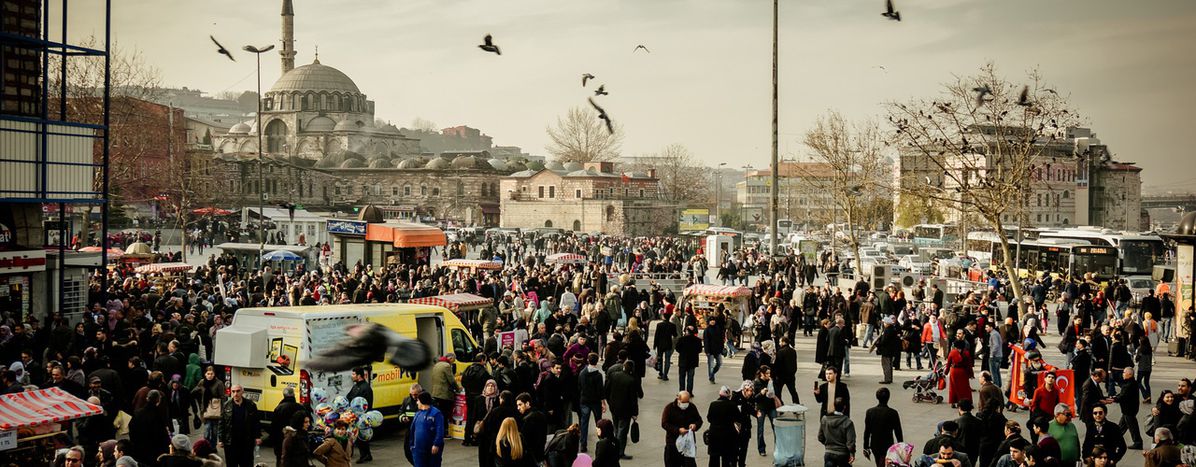
Turkey: Caught between development and alienation
Published on
Translation by:
Emily SpencerA few years ago, Turkey was a liberal-minded, democratic country. Today, Kurdish militants are persecuted, foreign correspondents are refused press passes and critics of the government are being silenced – all under the pretence of anti-terror legislation. Opinion piece.
In February 2014, I travelled to Turkey for the first time to study for a semester in Istanbul. I quickly became attached to the country. The city was exciting, fascinating and above all open; the air of revolution that had fuelled the previous year's Gezi Park protests was still tangible. What I considered to be a lively activist movement against the AKP government was in reality a last-chance resistance that was to be gradually suppressed thereafter.
When I look at Turkey today, I no longer understand it. A few days ago President Erdoğan defined terrorists as anyone who helped facilitate terror; be they lawmakers, academics or journalists. In his opinion, "There is no middle way." Whoever isn’t on the government’s side has chosen to be a terrorist.
He spoke in the context of the terrorist attack in Ankara on the 13th of March, which killed 37 people and injured many more. It is the third attack in the Turkish capital in the past five months. The country’s government named the Kurdistan Workers' Party (PKK), and the connected organisation YPG, responsible for the attack. For several months the Turkish army has headed up a war in its own territory against the PKK, in southeast Turkey – predominantly inhabited by Kurds. Disputes in residential areas occur daily. Civilians are dying, and the military are increasingly imposing day-long curfews.
Erdoğan’s terror campaign is a further curtailment of civil liberties.
Fighting back against state surveillance is not an option. Those who express support for freedom in Kurdish areas fear that they could be punished for being a "terrorist". Three Turkish academics were arrested just last Wednesday. In January, they signed a petition that demanded an end to violence in south-east Turkey.
When Erdoğan said that "all who facilitate terror" are terrorists, he was actually speaking about a further restriction of the freedom of speech and freedom of the press. The fact that critical journalism in Turkey faces challenges has been demonstrated by the forced departure of the SPIEGEL and SPIEGEL online correspondent Hasnain Kazim. After two and a half years, the Islamic-conservative AKP government refused the 41-year-old a press pass. Without any accreditation, he had no right of residence. He had to leave the country with his family.
Other correspondents were expelled on similar grounds. The press card application of Silje Rønning Kampesæter, foreign journalist for the Norwegian newspaper Aftenposten, was rejected. Die Welt correspondent Deniz Yücel was accused of being a PKK sympathiser; he was also refused a press card. The editorial board of the newspaper decided he should no longer report on the ground.
Erdoğan wants to take action against dissidents; members of the opposition and government opponents will be silenced under the pretext of the anti-terror campaign. What Turkey really needs at the moment is democratisation, instead of this autocratic headlock. Oppression breeds hatred, and hatred breeds terror. It's a vicious circle.
Classifying Turkey as a safe country of origin is cynical
In the current climate, it is important that Europeans express their opposition to Turkey's human rights violations. To handle the country with kid gloves, just because it is considered the only way out of the refugee crisis, is hypocritical – and based on a falsehood.
Before the EU summit – which began on Thursday – German Chancellor Angela Merkel praised Turkey’s achievements during the refugee crisis. She forgot to mention the random arrests byTurkish judicial authorities. Furthermore, to consider Turkey a safe country of origin sends the wrong message, despite the fact that EU states, it represents an important step towards being better able to control the influx of refugees.
That's because refugees who come from a safe country of origin or travel through a secure country during their journey, have little chance of receiving asylum in the EU. According to the Federal Agency for Civic Education, a country is defined as "safe" if its citizens are not persecuted. Yet that's exactly what's happening to the Kurdish people in Turkey: persecution.
For Erdoğan, the categorisation of Turkey as a safe country of origin would be a triumph, a victory of his authoritarian style of government over European values. That should not be allowed to happen.
Even if Turkey has become unfamiliar to me, I haven’t abandoned it. In a few weeks time, I will fly to Istanbul. I have mixed feelings about it. On the one hand, I'm excited to once again stroll through the streets of my favourite city. On the other I'm afraid; not of a possible terrorist attack, but that I will no longer be able to feel Istanbul’s fighting spirit.
---
This article was published by our local team at cafébabel Aarhus!
Translated from Zur Lage in der Türkei: Zwischen Entfremdung und Entfaltung



